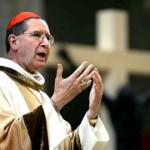 Few American bishops have pondered the future of ministry in the Catholic church as thoroughly as Cardinal Roger Mahony of Los Angeles. He issued a pastoral letter on the subject in 2000 called “As I Have Done For You,” presided over an archdiocesan synod in which ministry was a major focus, and sponsored three subsequent documents on leadership by the ordained and non-ordained, the role of a lay administrator in a priestless parish, and parish-based evangelization.
Few American bishops have pondered the future of ministry in the Catholic church as thoroughly as Cardinal Roger Mahony of Los Angeles. He issued a pastoral letter on the subject in 2000 called “As I Have Done For You,” presided over an archdiocesan synod in which ministry was a major focus, and sponsored three subsequent documents on leadership by the ordained and non-ordained, the role of a lay administrator in a priestless parish, and parish-based evangelization.
Mahony has a profile as something of a liberal, so some of his ideas may not be everyone’s cup of tea. Nonetheless, he’s produced a body of reflection on ministry that few specialized theologians can rival, to say nothing of bishops perpetually pulled in a thousand directions.
Now 73, Mahony spoke on ministry this week to a National Federation of Priests’ Councils convention in San Antonio. At one point he sketched 17 specific challenges facing the church, saying his aim was not to present definitive positions but to foster discussion. Whatever conclusions one may reach, the questions offer a roadmap to the terrain.
The following summary of sum of the challenges based on excerpts from Mahony’s San Antonio address.
1. “Some really harsh generational divides” among priests, “with the younger generation often quite openly challenging the orthodoxy of older priests.”
2. A need for “welcome and hospitality” in parishes. (Mahony offered a practical example: “On several occasions I have called parish offices and got entangled in the web of voicemail menu choices, trying to extract myself from the non-stop options without ever being able to speak to a real, live person.”)
3. In light of the priest shortage, deacons are increasingly being formed to administer priestless parishes. Does that risk “undermining the integrity of the diaconate as a ministry distinct from the ministerial priesthood”?
4. Offering “proper theological and pastoral formation” for lay ministers, at a time when the economy is prompting greater reliance on volunteers and deacons.
5. How to foster a strong identity among young priests, without making them “less collaborative, less flexible,” and more inclined to throw their weight around. (Mahony appended what he said is a true story: “One of our seminary professors asked a first year seminarian: Why have you asked your bishop to transfer you to another seminary? Answer: Because the priests, sisters and professors at Saint John’s Seminary want to give the church to the laity!”)
6. Taking a “hard look” at the changing face of seminarians in terms of age, culture, and language. (“Do we realize,” Mahony asked, “that some of our seminarians from diverse cultures have little or no interest in what many of us think of as ‘multiculturalism’?”)
7. “Too many liturgies and homilies are not what they might be, often because of a lack of a good grasp of Scripture as the basis for homilies and for liturgy planning.”
8. “A slowing down of ecumenical efforts at the local level, and at all levels.”
9. A “weakening” of social concern among parishioners, driven in some cases by moral and political disagreement. (Mahony cited an example: “The church’s current efforts at comprehensive immigration reform have often been met with outright denunciation as the anti-immigrant mood takes deeper root.”)
10. Threats to parish unity from “the re-introduction of the Latin Mass and more ‘sacred’ liturgies, which have the effect of creating two parallel communities.”
11. How to articulate the church’s positions on sexuality “in a plausible and compelling way.”
12. “More parish retreats, to give people an inexpensive and parish-related quiet time.”
13. A “poorly realized renewal of reconciliation ministry within parishes — especially the Sacrament of Reconciliation.”
14. Training laity to provide spiritual direction, “as part of a larger spiritual renewal ministry in the parish.”
15. “The nagging problem of too many people getting children baptized, and getting married, outside their own parish.”
16. “Not enough attention to a communal approach to the sacrament of Anointing of the Sick, as an integral part of a community’s care for the sick.”
17. Greater interaction among all the parishes in a diocese, especially “where there are many social classes and many cultural groups.”
by John L Allen Jr on Apr. 30, 2009 * All Things Catholic, National Catholic Reporter

Wow ! The esteemed Cardinal hits many nails on their heads.
I see a lot of his challenges in our own Diocese and I’m happy someone else sees them also. Didn’t realize these problems were so national to this country.